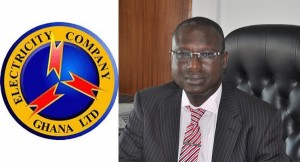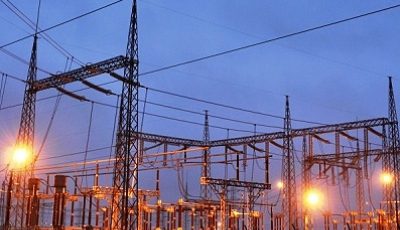Warning: Undefined array key "dirname" in /home/anapuafm/public_html/wp-content/themes/anapuafm/include/plugin/filosofo-image/filosofo-custom-image-sizes.php on line 133
Warning: Undefined array key "extension" in /home/anapuafm/public_html/wp-content/themes/anapuafm/include/plugin/filosofo-image/filosofo-custom-image-sizes.php on line 134
ECG Boss Declares New Tariff Too Small
 The Managing Director (MD) of the Electricity Company of Ghana (ECG), Rev. William Hutton-Mensah, says the company has accepted the recently increased tariffs by the Public Utility Regulatory Commission (PURC), even though in their view it is not enough.
The Managing Director (MD) of the Electricity Company of Ghana (ECG), Rev. William Hutton-Mensah, says the company has accepted the recently increased tariffs by the Public Utility Regulatory Commission (PURC), even though in their view it is not enough.
He adds that ECG despite the many challenges will efficiently utilize the monies that will be collected from customers to improve infrastructure and ensure constant power supply to its cherish customers in an uncompromising manner.
Meanwhile, Tariff Adjustment and Management Team of ECG, has warned against any attempt by the PURC to reduce the recently approved electricity tariff as it may collapse the company.
Rev. Hutton-Mensah who is said to be enjoying a perfect human and working relationship with officials of the company said this in an exclusive interview with The Herald, days after the PURC agreed to allocate a 78.9 per cent tariff increment for the company, beating down their earlier demand of 214 per cent.
However, the ECG boss is calling on government through the Ministry of Energy and Petroleum, donor agencies and business partners to come to their aid by helping to cushion the company to meet the expectations of Ghanaians. Government’s assistance in this direction will best be needed in the building of infrastructure and construction of sub-stations to enhance power delivery.
Though Ghanaians, especially the labour front led by the Trades Union Congress (TUC), have condemned the increment as outrageous for the ordinary Ghanaian and describing government as “insensitive”, the ECG feels the percentage was woefully inadequate, but it has accepted to work with it.
Touching on wastages in the system, Rev. Hutton-Mensah explained that since his appointment some 18 months ago, ECG has successful reduced wastage from 27 per cent to 23 per cent nearing the PURC’s 21 per cent barrier. Comparatively, whiles Ghana is far ahead of lots of her neighbours, especially Ivory Coast and Nigeria which are trailing with 30 per cent and 40 per cent respectively, with respect to the lost power.
In Africa, Rev. Hutton-Mensah revealed that ECG comes only next to South Africa, adding that Ghana is respected on the continent even though back home it is rated low mainly because of the challenges it faces.
In spite of these challenges, EGC has won lots of awards with the latest being the Best Distributor of Electricity in West Africa, he said, adding that most countries in the sub-region once in a while come for training especially on “Loop Distribution” which is preferred by these countries as against “Linear System” of power distribution.
He disclosed that their performance over the past months has improved so much that in their recent meeting with officials of the International Monetary Fund (IMF) and the World Bank (WB), they were so much impressed about what they have been able to achieve within the period, especially the significant reduction in wastage.
He assured the general public that the company was committed to its promise of reducing waste to the barest minimum adding, that they are working assiduously to clear all the bottlenecks in the system. These measures to him would go a long way to increase revenue generation, and help improve service delivery.
According to him, the survival of the economy depends mainly on stable and regular power supply, and so it is only proper that they help build the economy by supplying the needed amount of power.
The MD tasked Ghanaians to desist from practices such as illegal connection of power, which according to him only draws back the work of the company, adding that members of the public need to help ECG by reporting anybody that engages in illegal power tapping, stressing that “people should stop stealing power”.
He mentioned that the company was still pursuing its automatic billing exercise, and when completed, would help solve disagreement in bills and further reduce wastage just like it is in Europe.
On achievements, he said, so far, ECG has succeeded in migrating 35 per cent of its customers on to the prepaid meters system and it is anticipated that in the next two years, all the urban centres would be migrated to end the era, where customers use power but are reluctant to pay their bills.
He decried urban slam phenomenon as one of their challenges and explain that it makes it difficult for officials to identify illegal connections within these areas, but assured that ECG was steadfast tracing such areas to collect all revenue due the company.
On accessibility, records show that 72 per cent of Ghanaians enjoy electricity, largely due to the popular Rural Electrification Project (REP), introduced some years ago.
Asked about industries and companies who have had challenges in the past settling their bills, Rev. Hutton-Mensah said that ECG has introduced what it calls Automatic Metered Meter (AMR) for all industries free of charge, and it is aimed at helping them know what they consume at a given period.
He said this innovation has brought about efficiency in revenue as billing of these industries has become very simple as precision is largely attained.
He also disclosed that recently ECG introduced a system called “Life Line Work”, which is an innovation in West Africa. It was introduced in the supply chain so that in areas that low voltage is experienced, power could be enhanced.
It is also aimed at curbing the situation where mere maintenance works or technical fault in an area lead to a total disconnection by ECG until the fault is repaired.
Rev. Hutton-Mensah told The Herald that ECG had employed the services of Danish officials who are in the country training ECG officials on the technology.
He disclosed that projects are ongoing throughout the country to enhance efficient and quality power supply, he mentioned in particular the Dansoman District Office Commissioning, the Tema Materials Depot, the KNUST Commissioning of High Voltage Laboratory, Agyirigano Bulk Supply Point and the Loss Reduction and System Improvement Project as a few of them.
These and many others he mentioned have improved power supply significantly.




